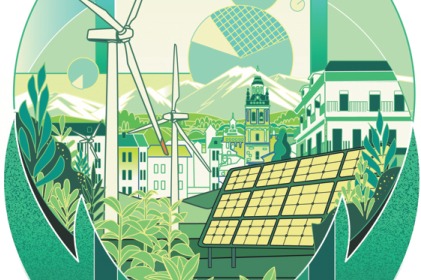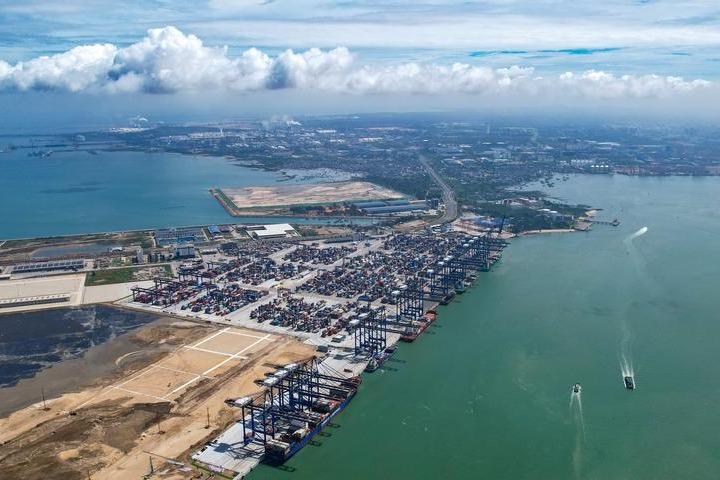'De-risking' only a lose-lose option for EU


The year of 2023 marks the 20th anniversary of the establishment of the comprehensive strategic partnership between China and the European Union, and this year the 24th China-EU Summit on Dec 7 will return to offline sessions for the first time since 2019.
In June 2023, the EU unveiled its Joint Communication on a European Economic Security Strategy, emphasizing a three-pronged approach in its relations with China. It formally introduced “de-risking” as a strategic approach toward China, aiming to enhance Europe’s independence in critical technological areas and raw materials supply, as well as the autonomy of production chains, considering them as serious threats to European economic security. This move seeks to diminish the capabilities of “strategic competitors” like China while maintaining cooperation in the majority of goods and services trade between China and Europe. It is essential to note that this approach does not imply complete “decoupling”.
Currently, Sino-European relations confront challenges amid geopolitical competition. The European strategy toward China, particularly its emphasis on risk reduction, may intensify tensions between China and Europe, posing challenges to practical cooperation between the two sides.
In essence, “de-risking” reflects a form of “trade protectionism” that contradicts the principles of market economy and free trade rules. Fears among EU member states stemming from China’s substantial trade surplus has made them attribute it to what they perceive as China’s strong government intervention. Consequently, the EU has gradually implemented restrictive measures on China’s high-tech industries, such as limitations on importing chip materials and launching anti-subsidy investigations into low-cost Chinese electric vehicles. These actions aim to curb the development of Chinese enterprises in Europe.
From a formal perspective, the EU’s “de-risking” policy largely appears to blindly follow the diplomatic route of the United States, which doesn’t align with European interests. Despite the US and Europe’ different positions on China, there is a gradual convergence in rhetoric, and both sides are leveraging their dominant international mechanisms globally to collaboratively advance the “de-risking” process against China. This implies that Europe is compelled to sacrifice its own interests in China to serve the strategic objectives of the US. Undoubtedly, this compromises the strategic autonomy emphasized by the EU, proving detrimental to the development of friendly EU-China relations and the realization of each country’s individual interests in the international community.
From the perspective of outcomes, the de-risking policy not only fails to alleviate the security concerns that the EU harbors but also inflicts a significant blow to the collaborative relationship between China and Europe, introducing substantial risks to the deeply intertwined global economy. The core of the EU’s de-risking lies in the economic domain. The strategy underscores the need for the EU to enhance its competitiveness, strengthen the unity of the European market, and intensify efforts in human capital and skill development. The EU seeks to maintain its leading position in the fields of health, digital, and clean technologies, aiming to mitigate risks associated with dependence on a single supply source.
In the present context, where China plays a prominent role in global economic growth, reducing economic ties with China would exacerbate the challenges of addressing the sluggish recovery of the world economy. This approach represents a disruption to international cooperation, undermining the previously established cooperative ecosystem and preventing the international community from rallying collective efforts to tackle global risks. The EU should adapt to the current situation and, in various domains, propel the deepening of cooperation with China.
First, cooperation between China and the EU is a pragmatic move and a significant boon for EU member states. There is no consensus among EU member states on the de-risking policy. Instead, internal disagreements exist over its perceived radical and hasty nature. Some argue for a more open attitude toward engaging and cooperating with China. The burgeoning collaboration in the Chinese-German new energy vehicle industry and comprehensive cooperation in the aviation manufacturing and materials sector between China and France exemplify the positive dynamics. The positive interactions between the two major economies in the EU can play a leading role in fostering China-EU cooperation. Additionally, the EU should break free from political and ideological constraints, redefining China’s international role and the China-EU partnership. It should fully recognize China’s commitment to initiatives such as the Belt and Road, the concept of a community with a shared future for mankind, and global development proposals that reflect a responsible approach by a major nation willing to share development benefits with the world.
Capitalizing on the precious opportunity presented by the upcoming leadership summit, and leveraging the growing consensus on deepening economic and trade cooperation between China and Germany, as well as the supportive forces within the European Parliament, efforts should be made to restart the Comprehensive Agreement on Investment. This could open a new chapter in the all-encompassing development of China-EU relations.
Second, there remains extensive room for cooperation between China and the EU in the fields of economy and trade, as well as collaborative efforts in climate governance related to clean energy, green manufacturing and sustainable transportation. Since the outbreak of the Russia-Ukraine conflict, China and the EU have jointly shouldered international responsibilities in geopolitical and international crisis management.
Third, amid the intensifying competition among major powers, China and the EU, as significant proponents of globalization, need to unite and support each other to collectively promote global peace and prosperity. The tactical easing of tensions between China and the US has removed some obstacles for the China-EU leaders’ summit. However, it’s vital for the EU to strengthen strategic autonomy.
Looking ahead at the international landscape, the enduring uncertainty and risks in the relationship between China and the US underscore the crucial role of China-EU relations in advancing global peace and prosperity. In the short term, China-EU cooperation is beneficial for fostering a positive collaborative environment; in the long term, it will contribute to the capacity building and strategic autonomy of the EU.
China-EU cooperation is an inevitable choice for China and Europe in promoting national economic development and safeguarding core national interests in the contemporary era. It is also a necessary means to drive global stability and prosperity. The EU should seize the opportunity presented by the China-EU leaders’ summit, discard the erroneous perception of de-risking, and continually deepen the comprehensive strategic partnership between China and the EU. Together, they can promote the stability and long-term development of bilateral relations.
The author is director of the Institute of International Affairs at Renmin University of China.
The views don't necessarily reflect those of China Daily.
If you have a specific expertise, or would like to share your thought about our stories, then send us your writings at opinion@chinadaily.com.cn or comment@chinadaily.com.cn.


































